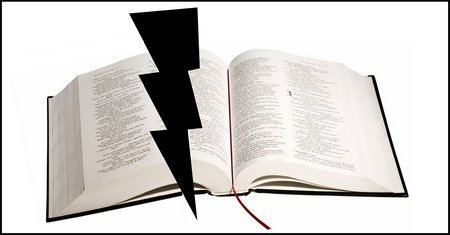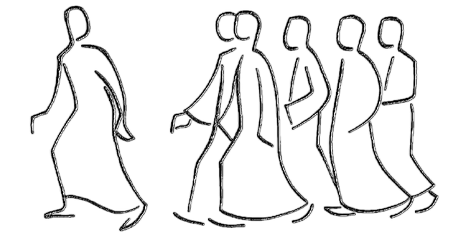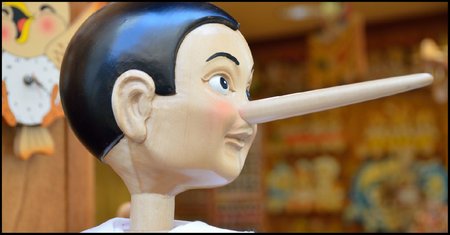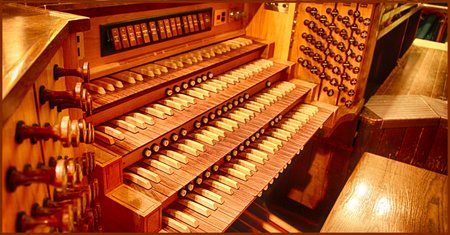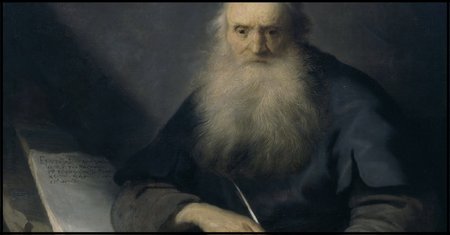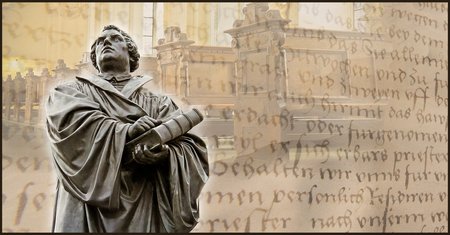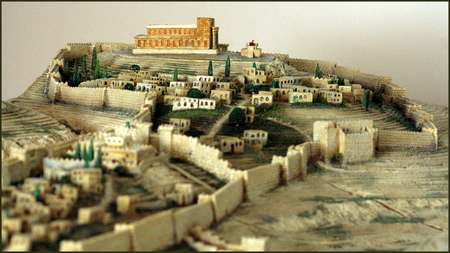Category: Authority
Subject: Authority
The Patternists: Parental Responsibility
The Virginia gubernatorial election became national news a couple of weeks ago, as the two candidates expressed sharp disagreement on the part that parents should play in the education of their children. The Republican candidate, Glenn Youngkin said, “I believe parents should be in charge of their kids’ education.” The Democrat candidate, Terry McAuliffe said, “I don’t think parents should be telling schools what they should teach.”
Continue reading “The Patternists: Parental Responsibility” →
The Word of a King
(Ecclesiastes 8:2-4), “I say, ‘Keep the king’s commandment for the sake of your oath to God. Do not be hasty to go from his presence. Do not take your stand for an evil thing, for he does whatever pleases him.’ Where the word of a king is, there is power; And who may say to him, ‘What are you doing?’”
The wise man’s words ring true in our time. As pandemic mandates gain traction, and our society polarizes more and more each day, many feel that our government is guilty of overreach. Whatever your view of this particular matter, there are a few points that are beyond dispute.
FIRST, our responsibility to be obedient to the governing authorities is one that has God as it’s source. It is a part of our agreement as Christians. Paul agreed with the wise man on this matter (cf. Romans 13:2). Of course, there are limits (cf. Acts 5:29).
SECOND, doing what is unlawful (“an evil thing”) will bring consequences from the authorities — “for he does whatever pleases him.” It is always a losing hand to rail against “the man.”
THIRD, “Where the word of a king is, there is power.” We may not like it when the authorities abuse their authority. We may cry out and complain — but no amount of threatening on our part will keep them from doing what they want to do.
It is for this reason we long for eternity. We realize that in the end, this world is a mere layover to eternity. In the end all inequities will be resolved. All abuses will come to an end. All suffering will cease. Praise be to God! “But even if you should suffer for righteousness’ sake, you are blessed. ‘And do not be afraid of their threats, nor be troubled’” (1 Peter 3:14).
Click below to…
Sermon: Silence is Virtue
In a world full of noise, it is important to note virtue of being silent. It indicates reverence, respect, submission and discretion. Sometimes it is best to be silent!
The Patternists: Transgressions Bring Judgment
The book of Amos begins with declarations of judgment against various nations. The form of the declarations is uniform, beginning with the phrase, “for three transgressions… and for four.” For example, “Thus says the Lord: ‘For three transgressions of Damascus, and for four, I will not turn away its punishment, because they have threshed Gilead with implements of iron” (Amos 1:3). Also included are declarations against, Gaza (1:6), Tyre (1:9), Edom (1:11), Ammon (1:13), Moab (2:1), Judah (2:4) and Israel (2:6).
These simple declarations reveal why God’s judgment comes upon any people, either collectively or individually. They come because of transgressions. The Hebrew word in this context (pesa) is translated in the Old Testament using words like, transgression, sin, trespass and rebellion.
Continue reading “The Patternists: Transgressions Bring Judgment” →
The Patternists: Departures from Christ
The second and third chapters of Colossians serve to warn us of the danger of departing from Christ and His will for man. Paul states that in the “knowledge of the mystery of God, both of the Father and Son” are “hidden all the treasures of wisdom and knowledge” (2:2-3).
Does that mean the Bible contains all truth? No. But it does contain all the truth that pertains “to life and godliness” (cf. 2 Peter 1:2-4). As Paul wrote, “All Scripture is given by inspiration of God, and is profitable for doctrine, for reproof, for correction, for instruction in righteousness, 17 that the man of God may be complete, thoroughly equipped for every good work” (2 Timothy 3:16-17).
Continue reading “The Patternists: Departures from Christ” →
The Patternists: He Cannot Be My Disciple
In Luke 14:28-32, Jesus taught two parables about counting the cost. A man should count the cost of building a tower, so that he doesn’t run out of money before it is finished. A king should count the cost before going to war against an army twice the size of his own, so that he is not defeated in his efforts.
The two parables show the importance of counting the cost before making an important decision. Jesus taught the parables to make a point about discipleship.
Continue reading “The Patternists: He Cannot Be My Disciple” →
The Patternists: Are You Honest? Or a Liar?
Let me ask you a question. “Do you know God?”
“You do? Wonderful! But, can I trust your answer? Do you really know God? You aren’t lying, are you? Can you prove that you really know God?
The above conversation would anger some, unsettle others. I understand that many would take offense at being asked such a question, and then having their affirmative response questioned or challenged. But, consider the following words from the pen of John the apostle.
“Now by this we know that we know Him, if we keep His commandments. He who says, “I know Him,” and does not keep His commandments, is a liar, and the truth is not in him. But whoever keeps His word, truly the love of God is perfected in him. By this we know that we are in Him. He who says he abides in Him ought himself also to walk just as He walked” (1 John 2:3-6).
Continue reading “The Patternists: Are You Honest? Or a Liar?” →
The Patternists: Building on the Sand
My grandson (2 years old) loves to have his Granna sing the wise man/foolish man song to him. Lately, each time he visits he goes directly to the giant LEGO blocks we have for the grandkids to play with, to get Granna to build a “house” for him to demolish when she gets to the words, “And the foolish man’s house went, SPLAT!” (Giggle, giggle, then do it all again).
Jesus’ words in Matthew 7:24-27, paraphrased in the song, teach significant truths that both children and adults need to learn. Consider what Jesus said:
“Therefore whoever hears these sayings of Mine, and does them, I will liken him to a wise man who built his house on the rock: 25 and the rain descended, the floods came, and the winds blew and beat on that house; and it did not fall, for it was founded on the rock. 26 But everyone who hears these sayings of Mine, and does not do them, will be like a foolish man who built his house on the sand: 27 and the rain descended, the floods came, and the winds blew and beat on that house; and it fell. And great was its fall.”
The Patternists: Instrumental Music in Worship
Our objection to the use of mechanical instruments of music in Christian worship is a simple one. No authority for the practice is found for it in the New Testament. We do not deny that is was present in the worship offered to God by the Jews under the Old Covenant. Nor do we deny that there is a reference to instruments in heaven, as found in the book of Revelation.
It is simply that Christian worship must follow the pattern that God has given for it! There is no command in the New Testament for Christians to worship Him with instruments. There is no example of Christians worshipping God with musical instruments. There is no intimation whatsoever in the New Testament that God either requires or accepts such worship to Him.
Continue reading “The Patternists: Instrumental Music in Worship” →
The Patternists: Paul – A Simple Apostle
Question: Who was the most educated apostle among Jesus’ chosen men? We know that Peter, Andrew, James and John were simple fishermen in Galilee. Matthew was a tax collector, typically indicating some business acumen. Little is known from scripture about the other seven men’s educational background.
An interesting statement is made about Peter and John after their arrest for teaching “in Jesus the resurrection from the dead” (Acts 4:2). Luke records Peter’s address to the Sanhedrin, and the response of the assembly, “Now when they saw the boldness of Peter and John, and perceived that they were uneducated and untrained men, they marveled. And they realized that they had been with Jesus” (4:13).
Continue reading “The Patternists: Paul – A Simple Apostle” →
The Patternists: Carrying the Ark
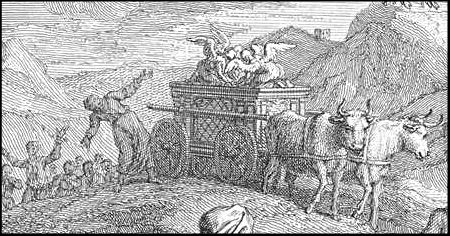
The ark of the covenant had a long history with Israel, serving as the point of interaction between God and the nation from the time the tabernacle was erected in the wilderness (cf. Exodus 40:17-21,34).
In the building of the ark, rings were set at each of its four corners, and poles of acacia wood, overlaid with gold were put into the rings, “to bear the ark.” (Exodus 37:3-5). After the establishment of the priesthood as found in the book of Leviticus, it fell upon the Levites to care for and bear the ark as the tabernacle was moved from place to place (Numbers 1:49-53; 3:31). The actual directions given concerning the packing and carrying of all the furniture in the tabernacle is revealed in Numbers 4, ending with these instructions, “And when Aaron and his sons have finished covering the sanctuary and all the furnishings of the sanctuary, when the camp is set to go, then the sons of Kohath shall come to carry them; but they shall not touch any holy thing, lest they die. These are the things in the tabernacle of meeting which the sons of Kohath are to carry” (15). The poles were inserted into the ark to allow it to be carried, without touching it or the holy things stored upon it. Not only was the Levite family of Kohath not to touch the ark, God told Moses, “But they shall not go in to watch while the holy things are being covered, lest they die” (20).
The Patternists: Reformation VS Restoration
The Reformation Movement is well known. The term refers to the efforts of men like Martin Luther, beginning in the 16th century, who sought to reform certain practices of the Catholic church. These men believed such practices were in violation of scripture. Interestingly, before being branded as heretical by the Catholic church, Luther was a priest in that organization. He wasn’t seeking to leave it, he simply wanted to make it better by making changes.
The term “reform” is defined as: “make changes in (something, typically a social, political, or economic institution or practice) in order to improve it.”
Continue reading “The Patternists: Reformation VS Restoration” →
Sermon: The Curious Case of Micah and His Idols
Micah was one in Israel (like many others) who did what was right in his own eyes (cf. Judges 17:6). His willful, uninformed worship of God teaches us much about the dangers present in our own day.
The Patternists: David and the Temple
In 1 Chronicles 17:1, David showed a sincere heart in his desire to build a permanent Temple to honor God. “Now it came to pass, when David was dwelling in his house, that David said to Nathan the prophet, ‘See now, I dwell in a house of cedar, but the ark of the covenant of the Lord is under tent curtains.”
Interestingly, it seems that Nathan’s response to David was presumptuous. That is, it came from Nathan himself, rather than from God. Nathan said to David, “Do all that is in your heart, for God is with you” (17:2). Much of Nathan’s words were accurate. David was certainly a righteous king, and in general his reign was in accord with God’s purpose. However, it was wrong for Nathan to assume God would desire for David to build the temple.
The Patternists: Walking in the Light
In 1 John 1:7-9, John gives us a wonderful promise. “But if we walk in the light as He is in the light, we have fellowship with one another, and the blood of Jesus Christ His Son cleanses us from all sin. If we say that we have no sin, we deceive ourselves, and the truth is not in us. If we confess our sins, He is faithful and just to forgive us our sins and to cleanse us from all unrighteousness.”
Our question, since the promise is that God will cleanse us from all unrighteousness, is, “What does it mean to walk in the light?” John gives us some idea of that in his phrase, “as He is in the light.”







